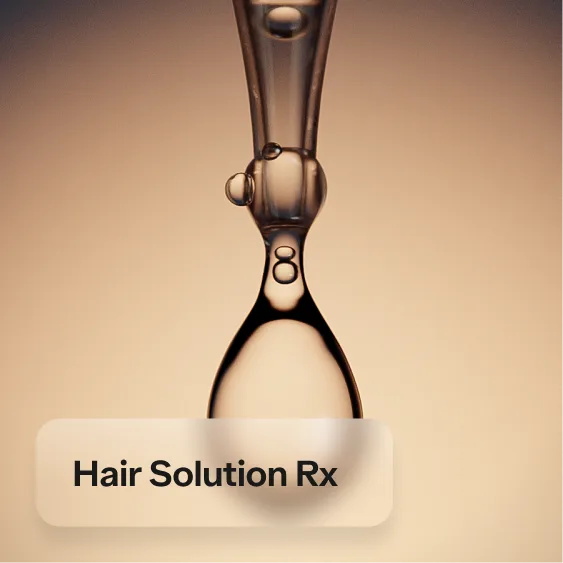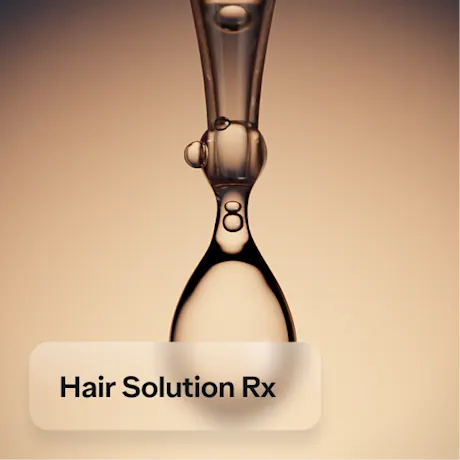

Important Safety Information for Hair Solution Rx
Hair Solution Rx is a compounded prescription drug. Compounded drugs are permitted to be prescribed under federal law, but are not FDA-approved and do not undergo safety, effectiveness, or manufacturing review.
Important Safety Information for Topical Minoxidil
What is topical minoxidil used for? Your Ro-affiliated provider may recommend the use of topical minoxidil on the scalp as a treatment for hair loss, in combination with topical tretinoin and topical melatonin as a compounded product.
Compounded drugs are permitted to be prescribed under federal law, but are not FDA-approved and do not undergo safety, effectiveness, or manufacturing review. Who should not use Hair Solution Rx? Do not use topical minoxidil if:
You are pregnant, you are trying to get pregnant, or you are unsure whether you are pregnant. When prescribed as an oral medication, tretinoin, one of the ingredients in Hair Solution Rx, was associated with miscarriage and birth defects. While there is inconclusive evidence that tretinoin applied topically can cause miscarriage or birth defects, it is best to be cautious. Tretinoin should be used during pregnancy only if the potential benefit justifies the potential risk to the fetus.
Your scalp is red, inflamed, infected, irritated, or painful
You have a known allergic reaction to minoxidil, tretinoin, or melatonin
How should I use the topical treatment?
This topical compounded treatment should be applied directly to the affected area on the scalp once daily in the evening, or as specified by your provider. The total amount applied should not exceed 1 mL (the dropper has a 1 mL marker). Allow the product to completely dry before going to bed.
If using your hands to apply, wash your hands afterwards.
To minimize the chance of unwanted hair growth, it is important to make sure that no product drips onto the face and, if it does, to wipe it off immediately.
If your symptoms are not improving or you have any questions about changing or stopping medication, reach out to your Ro-affiliated provider for guidance.
What should I tell my Ro-affiliated provider before using topical minoxidil?
It’s important to tell your Ro-affiliated provider all of the topical as well as oral medications you are currently using, including prescription, over-the-counter medications, vitamins, and herbal and dietary supplements, even if you think they are unrelated to the condition being treated. Let your provider know if you are using or planning to use any other topical scalp treatments.
It’s important to share your entire medical history with your provider. In particular, tell your provider if you have a history of heart disease.
Tell your provider if you are pregnant, planning to become pregnant, or breastfeeding.
What are the most serious side effects that I should monitor for when using topical minoxidil?
If you are experiencing a medical emergency, call 911 or seek immediate medical attention.
These serious side effects are rare, but may occur with topical minoxidil. Tell your provider if:
Chest pain, rapid heartbeat, faintness, or dizziness occurs
Sudden, unexplained weight gain occurs
Your hands or feet swell
Scalp irritation or redness occurs
Unwanted facial hair growth occurs
Inflammatory reaction with blistering occurs
Withholding or providing inaccurate information about your health and medical history in order to obtain treatment may result in harm, including, in some cases, death. What are the most common side effects of topical minoxidil?
If you have any of the following symptoms on the scalp while using your treatment, reach out to your Ro-affiliated provider for guidance.
Itching
Skin irritation
You are encouraged to report negative side effects of prescription products to the FDA. Visit www.fda.gov/medwatch or call 1-800-FDA-1088.
This summary provides basic information about Hair Solution Rx but does not include all information known about this medicine. If you're Hair Solution Rx, your Ro-affiliated provider will be able to answer questions about side effects before you begin treatment. You should also read the information that comes with your prescription each time your prescription is filled.
Important Safety Information for Tretinoin
What is tretinoin used for?
Your Ro-affiliated provider may recommend the use of topical tretinoin on the scalp as a treatment for hair loss, in combination with topical melatonin and topical minoxidil as a compounded product.
Compounded drugs are permitted to be prescribed under federal law, but are not FDA-approved and do not undergo safety, effectiveness, or manufacturing review.
Who should not use tretinoin?
Do not use tretinoin if:
You are pregnant, you are trying to get pregnant, or you are unsure whether you are pregnant. When prescribed as an oral medication, tretinoin, one of the ingredients in Hair Solution Rx, was associated with miscarriage and birth defects. While there is inconclusive evidence that tretinoin applied topically can cause miscarriage or birth defects, it is best to be cautious. Tretinoin should be used during pregnancy only if the potential benefit justifies the potential risk to the fetus.
Your scalp is red, inflamed, infected, irritated, or painful
You have a known allergic reaction to minoxidil, tretinoin, or melatonin
How should I use the topical treatment?
This topical compounded treatment should be applied directly to the affected area on the scalp once daily in the evening, or as specified by your provider. The total amount applied should not exceed 1 mL (the dropper has a 1 mL marker). Allow the product to completely dry before going to bed.
If using your hands to apply, wash your hands afterwards.
To minimize the chance of unwanted hair growth, it is important to make sure that no product drips onto the face and, if it does, to wipe it off immediately.
If your symptoms are not improving or you have any questions about changing or stopping medication, reach out to your Ro-affiliated provider for guidance.
What should I tell my Ro-affiliated provider before using tretinoin?
It’s important to tell your Ro-affiliated provider all of the topical as well as oral medications you are currently using, including prescription, over-the-counter medications, vitamins, and herbal and dietary supplements. Tell your provider if you are using or planning to use any other topical scalp treatments.
Tretinoin can make the skin on your scalp more sensitive to the sun and can cause drying and peeling.
Using tretinoin with other topical drying agents can increase the drying effects of tretinoin.
Some common oral medications that can make your skin more sensitive to the sun, including certain antibiotics and blood pressure medications, might exacerbate any sun sensitivity resulting from tretinoin use.
It’s important to share your entire medical history with your provider. In particular, tell your provider if you have a history of:
Eczema
Sensitivity to the sun or are easily sunburned
Conditions that may increase sensitivity to sunlight. These include systemic lupus erythematosus, cutaneous lupus erythematosus, albinism, and porphyria
Tell your provider if you are pregnant, planning to become pregnant, or breastfeeding.
Withholding or providing inaccurate information about your health and medical history in order to obtain treatment may result in harm, including, in some cases, death.
What are the most serious side effects that I should monitor for when using tretinoin?
If you are experiencing a medical emergency, call 911 or seek immediate medical attention.
These serious side effects are rare, but may occur with tretinoin.
Skin discoloration
Inflammatory reaction with blistering
What are the most common side effects of tretinoin?
If you have any of the following symptoms on the scalp while using your treatment, reach out to your Ro-affiliated provider for guidance.
Dryness
Itching
Burning
Redness
Peeling
You are encouraged to report negative side effects of prescription products to the FDA. Visit www.fda.gov/medwatch or call 1-800-FDA-1088.
This summary provides basic information about Hair Solution Rx but does not include all information known about this medicine. If you're Hair Solution Rx, your Ro-affiliated provider will be able to answer questions about side effects before you begin treatment. You should also read the information that comes with your prescription each time your prescription is filled.
Important Safety Information for Topical Melatonin
What is topical melatonin used for? Your Ro-affiliated provider may recommend the use of topical melatonin on the scalp as a treatment for hair loss, in combination with topical tretinoin and topical minoxidil as a compounded product.
Compounded drugs are permitted to be prescribed under federal law, but are not FDA-approved and do not undergo safety, effectiveness, or manufacturing review. Who should not use Hair Solution Rx?
You are pregnant, you are trying to get pregnant, or you are unsure whether you are pregnant. When prescribed as an oral medication, tretinoin, one of the ingredients in Hair Solution Rx, was associated with miscarriage and birth defects. While there is inconclusive evidence that tretinoin applied topically can cause miscarriage or birth defects, it is best to be cautious. Tretinoin should be used during pregnancy only if the potential benefit justifies the potential risk to the fetus.
Your scalp is red, inflamed, infected, irritated, or painful
You have a known allergic reaction to minoxidil, tretinoin, or melatonin
How should I use the topical treatment?
This topical compounded treatment should be applied directly to the affected area on the scalp once daily in the evening, or as specified by your provider. The total amount applied should not exceed 1 mL (the dropper has a 1 mL marker). Allow the product to completely dry before going to bed.
If using your hands to apply, wash your hands afterwards.
To minimize the chance of unwanted hair growth, it is important to make sure that no product drips onto the face and, if it does, to wipe it off immediately.
If your symptoms are not improving or you have any questions about changing or stopping medication, reach out to your Ro-affiliated provider for guidance.
What should I tell my Ro-affiliated provider before using topical melatonin?
It’s important to tell your Ro-affiliated provider all of the medications you are currently taking, including prescription, over-the-counter medications, vitamins, and herbal and dietary supplements. Let your provider if you are using or planning to use any other topical scalp treatments.
Withholding or providing inaccurate information about your health and medical history in order to obtain treatment may result in harm, including, in some cases, death.
Tell your provider if you are pregnant, planning to become pregnant, or breastfeeding.
What are the most common side effects of topical melatonin?
Temporary reddening
Sensitivity
Itching
Burning
You are encouraged to report negative side effects of prescription products to the FDA. Visit www.fda.gov/medwatch or call 1-800-FDA-1088.
If you are experiencing a medical emergency, call 911 or seek immediate medical attention. This summary provides basic information about Hair Solution Rx but does not include all information known about this medicine. If you're Hair Solution Rx, your Ro-affiliated provider will be able to answer questions about side effects before you begin treatment. You should also read the information that comes with your prescription each time your prescription is filled.